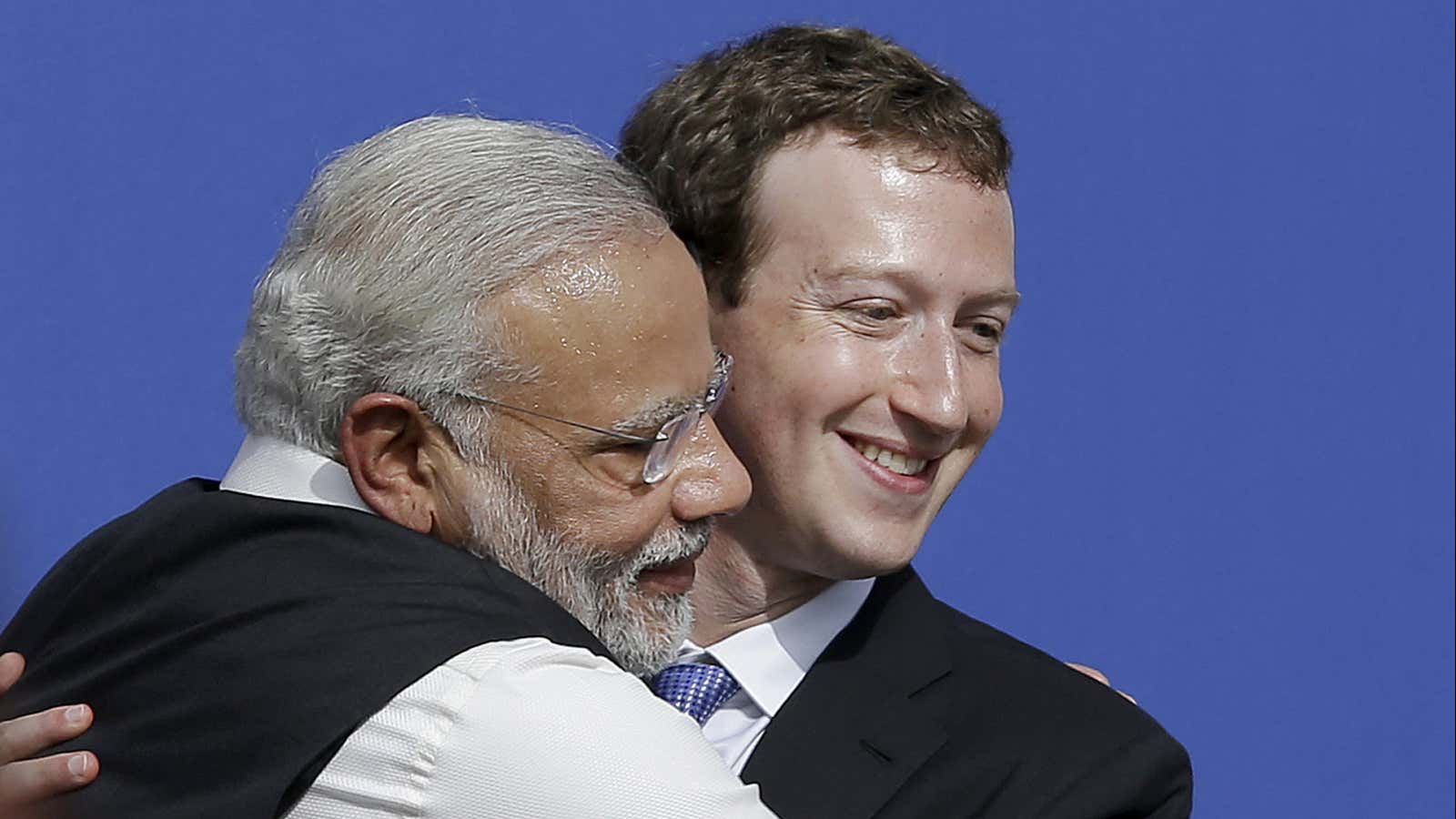In the wake of the voter-manipulation controversy surrounding British firm Cambridge Analytica, Indian law and information technology minister Ravi Shankar Prasad on March 21 sent out a terse warning to Facebook CEO Mark Zuckerberg.
“Mr Mark Zuckerberg, you better note the observation of (the) IT minister of India. We welcome the (sic) Facebook profile from India are the highest in the world. But if any data theft of Indians is done with the collusion of (the) Facebook system, this shall not be tolerated. We have got stringent power under IT act. We shall use it, including summoning you in India,” Prasad said.
Later in the day, Zuckerberg finally broke his silence on the CA fiasco. In a statement posted to his Facebook page, he said, “We have a responsibility to protect your data, and if we can’t then we don’t deserve to serve you.”
In an interview with CNN, Zuckerberg said he realised the need to ensure data security in the run up to the 2019 Indian elections, among others:
There’s a lot of hard work that we need to do to make it harder for nation-states like Russia to do election interference, to make it so that trolls and other folks can’t spread fake news, but we can get in front of this. And we have a responsibility to do this, not only for the 2018 midterms in the US…but there’s a big election in India this year, there’s a big election in Brazil, there are big elections around the world, and you can bet that we are really committed to doing everything that we need to to make sure that the integrity of those elections on Facebook is secured.
But India’s Bharatiya Janata Party (BJP)—indeed, the country’s major political parties—have a complicated relationship with the social media platform. Nonetheless, Prasad’s comments stand out for their sharpness.
The trigger, of course, is London-based political consultancy firm Cambridge Analytica’s alleged mining of the personal data of nearly 50 million Facebook users without their consent. To gather information on voters, the company created a paid personality quiz app on Facebook that covertly gathered data on users and their friends.
The Federal Trade Commission in the US is now reportedly investigating Facebook, while the British and European parliaments have summoned Zuckerberg over the matter.
The revelation has also sent ripples across India, the country with Facebook’s largest user base of over 241 million. And given that it has one of the world’s youngest electorates alongside rapidly growing smartphone usage, such data breaches—and its potential misuse—can cause material damage.
Indian politics and FB
In recent years, Indian politicians and political parties have taken to social media with much enthusiasm. The ability to reach out to citizens directly, without the traditional media and opinion-maker’s critical interference, has been one of the key reasons for this. This is besides the massive user bases of these platforms among Indians.
Social media played a vital role during the 2014 elections in India—disseminating not just kosher political campaign material but also a potent mix of fake news, an information blitzkrieg, and other forms of manipulation.
Several politicians used Facebook, Twitter, WhatsApp, and YouTube to campaign, but it was Modi—already the most popular Indian politician on Twitter by then—whose digital footprint made most headlines.
Ahead of the 2014 elections, the BJP set up a “digital war room” with a team of 40 professionals, mostly graduates from the elite Indian Institutes of Technology and the Indian Institutes of Management, to handle the party’s digital presence.
“It is like a 360-degree campaign which has been taken beyond the internet in this election. We connect to people through various platforms, including social networking sites like the Facebook and Twitter, and applications like WhatsApp,” Arvind Gupta, who headed that team, told Mail Today in 2014.
The relationship, particularly with Facebook, continued after Modi’s spectacular win. In 2015, Modi spent nearly an hour at Facebook’s California headquarters, chatting with Zuckerberg. The prime minister also did a townhall, even pointing out Zuckerberg’s parents. Meawhile, Modi’s senior ministerial colleagues, too, have interacted closely with the Facebook founder.
But it hasn’t been all smooth sailing for Facebook.
Free Basics, one of its initiatives offering a free but limited internet service, raised a storm in India. In February 2016, the Telecom Regulatory Authority of India ruled in favour of net neutrality, dashing Zuckerberg’s hopes of bringing the zero-rated service to India.
Now, Cambridge Analytica’s dirty-tricks chaos threatens to undermine the credibility of major political parties in the country.
For instance, the Congress party has accused the BJP-Janata Dal United (JDU) combined of taking assistance from Ovleno Business Intelligence (OBI), an Indian affiliate of Cambridge Analytica’s parent firm Strategic Communications Laboratories, for the 2010 Bihar assembly elections. The company’s website refers to an “in-depth electorate analysis” in the northern Indian state, adding that its “client achieved a landslide victory, with over 90% of total seats targeted by CA being won.” Indeed JDU had won with a landslide four-fifth majority back then.
The BJP has countered the allegation with a set of its own, saying that the British firm had s secret dealing with the Congress.
In fact, during the 2014 Indian general elections, Cambridge Analytica had reportedly reached out to both the Congress and the BJP, though neither alliance panned out. The firm has reportedly sent out feelers again for the upcoming general elections in 2019.
